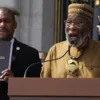Evanston’s Reparations Committee hosted a selection event on Jan. 11 at Evanston Township High School for the next round of reparations fund recipients.
A total of 453 direct descendants, those who are related to Evanston residents who were at least 18 years old and lived through racially harmful housing policies from 1919 to 1969, were given a randomly generated number that was then listed in a spreadsheet and randomly sorted to place determined their place in line to receive funds.
The committee expects to serve at least 80 people in 2024 but could serve more depending upon the amount of funding gathered through recreational cannabis taxes from Okay Cannabis Dispensary, a predominantly minority-owned dispensary that is expected to open next month at the southern border of the city. The new dispensary will be the second opened in the city alongside Zen Leaf on Maple Ave in downtown Evanston.
Evanston’s reparations program began after Evanston City Council voted in late 2019 to establish a fund paid for with tax revenue from the city’s adult recreational marijuanna sales. An additional $1 million a year will be allocated to the reparations fund from the real estate transfer tax coffers starting this year until 2034.
Since then 117 of the 140 ancestors, those who were directly harmed by racial housing policies Evanston had in place from 1919 to 1969, have been served and a total of $2,953,596 has been disbursed according to Assistant to the City Manager Tasheik Kerr.
Each recipient has the option to use their allocated $25,000 for a down payment on a home, repairs or improvements to a home they already own, assistance with mortgage payments or a direct cash benefit. Recipients can also choose to split the funding across several options.
Dino Robinson Jr., founder of Shorefront Legacy, a nonprofit that has studied and documented the history of Black Evanston, spoke about the impact of the city’s desire to right its wrongs.
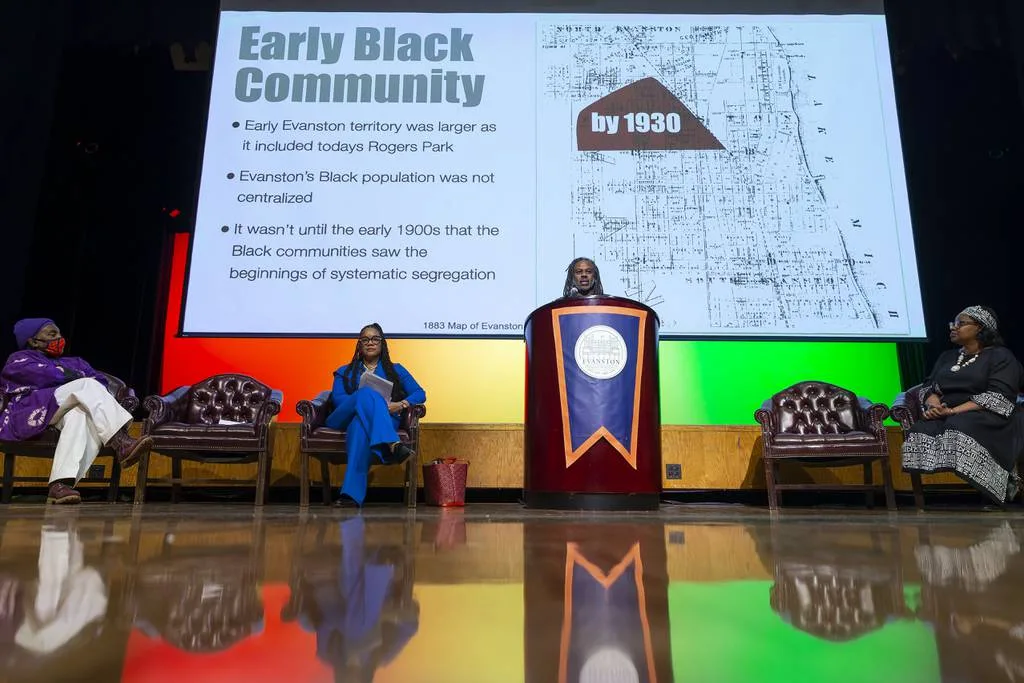
“They don’t want a sugarcoated story. They wanted the truth,” Robinson said. “Because of that, we are able to honor what our ancestors have done. And you sitting here in this audience are living proof of what your ancestors, your family, your relatives have done in this community.”
Lifelong Evanston resident Alva Hannon placed 418 on the list and hopes to use her $25,000 on a down payment for a new home. She currently lives in her childhood home in the city’s 2nd Ward just down the street from the high school and assists her mother who lives with mobility issues.
“It’s not about where you place in the line, it’s just that you’re in the line,” Hannon said. “To even be considered for something like this is a great thing.”
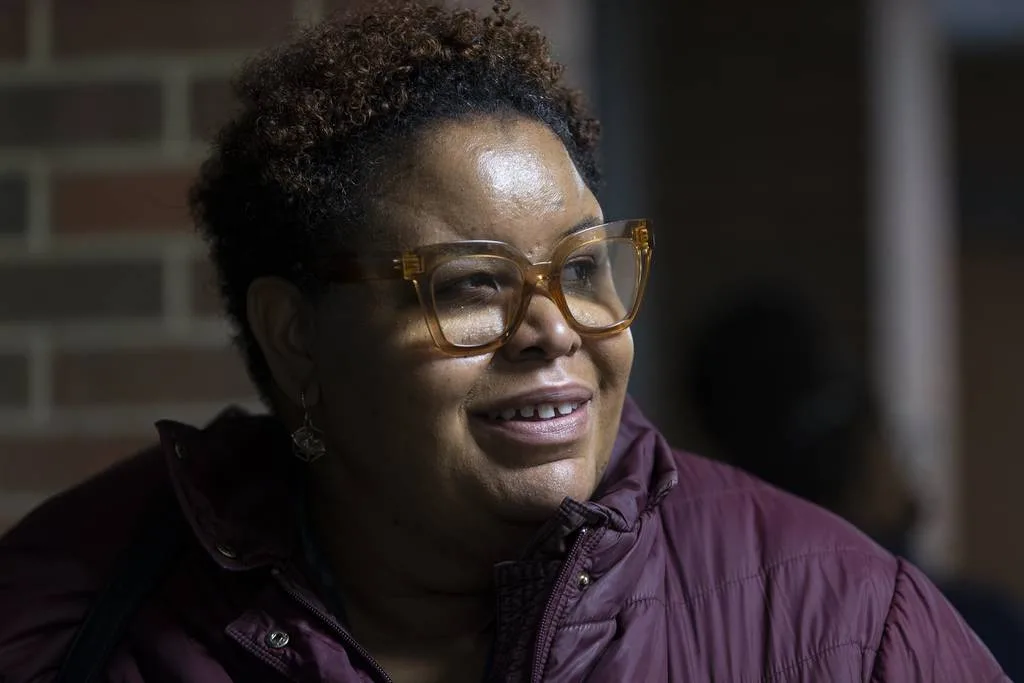



Her parents moved from Louisiana to Evanston in the 1950s and bought their home in 1969. Hannon is one of three siblings and the only one still residing in the city. Following in her parents footsteps, she became an educator who teaches early childhood education in District 65 — the same school district she attended as a child until her graduation from ETHS in 1992.
Hannon said she has never considered leaving Evanston and is looking forward to marrying her fiance who currently lives in Ghana in March.
“Evanston is like Mayberry,” she said. “I felt like I was at a family reunion today.”
Real estate professional Vanessa Johnson-McCoy’s family story begins with her father William Johnson, a Navy veteran who grew up off Dodge Avenue and Lyons Street. Because her father worked at Evanston Hospital, Johnson-McCoy always assumed that’s where she had been born. As she grew older, her mother Florence told her she was actually born at Community Hospital of Evanston, the first Black medical center north of the Chicago Loop, according to Shorefront records.
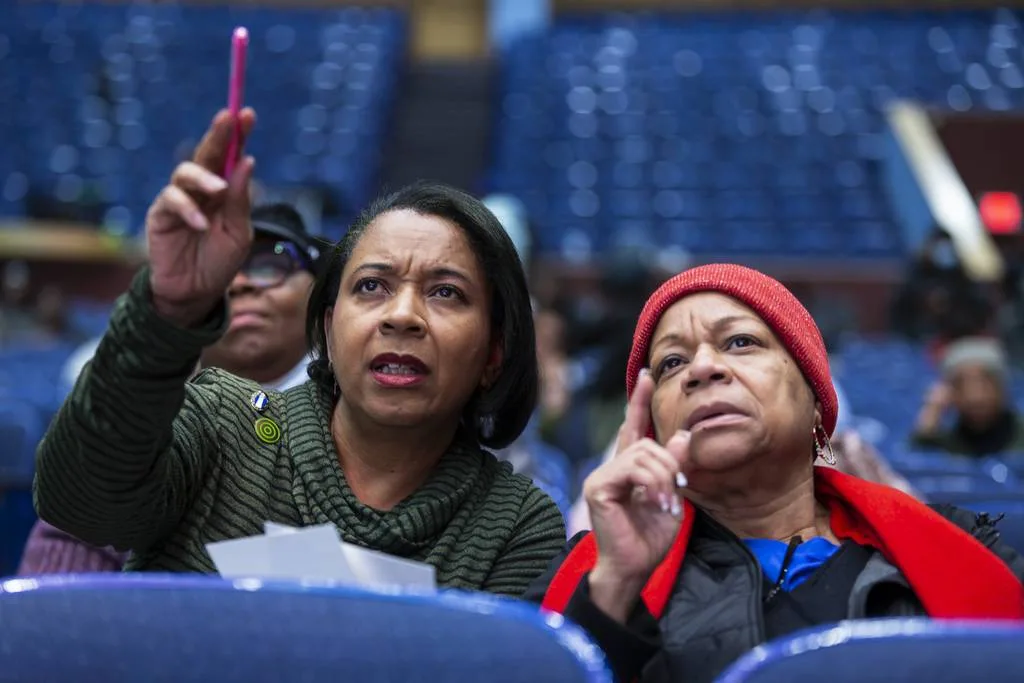



Johnson-McCoy, the youngest of her siblings, was born after area schools had begun the process of desegregation and was bused every day to Skokie for classes. Her older siblings were educated at Foster School, which according to Shorefront by 1945 was populated by almost exclusively Black students. Her family was one of the first Black families to move to Fowler Avenue but they wouldn’t be the last.
“At that time, she (Florence) said there were whites across the street but she could see them looking out of their windows as they (Florence and her family) were moving in,” Johnson-McCoy said. “Shortly after, the whites moved out so it (the block) became predominantly Black.”
Florence, now 93 years old, is still meticulous about paying her bills on time — something her daughter came to realize stems from worries that a late payment could give banks the ammunition to take possession of the family home. Florence is one of the 140 ancestors, those who were directly impacted by racial housing policies, who received reparations for the harm she endured. Ancestors were the first group served by the committee to ensure the oldest of reparations recipients received their funding as soon as possible.
Johnson-McCoy has seen remnants of the racial housing policies that her parents lived through with her work in real estate.
“When I would do the valuation of properties in the historically Black area, the same house that’s there, the value would be much less than if you picked up that same house and put it in another area,” she said. “Thousands of dollars less just because it (history) hasn’t caught up.”
Both Johnson-McCoy and her eldest son were sorted within the top 80, placing 58 and 78, respectively, meaning they will receive their reparations this year. She isn’t certain yet what she wants to do with the money but may do some repairs and improvements around her home. She hopes to use remaining funds to purchase an investment property in Evanston and build back some of the generational wealth that Black Evanstonians have historically been barred from.
Marvella Bowen’s life mirrors Johnson-McCoy’s in many ways, having been born at Community Hospital with family that owned property on Fowler Avenue. But Evanston wasn’t Bowen’s only home. She split her time between her mother’s Evanston home and the house her father bought in Glencoe in 1960. Bowen graduated as part of ETHS’ Class of 1983.
She has lived all over the world from California to Japan but moved back to Glencoe where she lived in a condo for 18 years. Due to rising homeownership costs across the North Shore, Bowen joined her two sisters in Wheeling in early 2023. All three were in attendance at the selection event waiting for their numbers. Residents outside Evanston would have to indicate their intention to move back to Evanston in order to receive their funding, according to city officials.
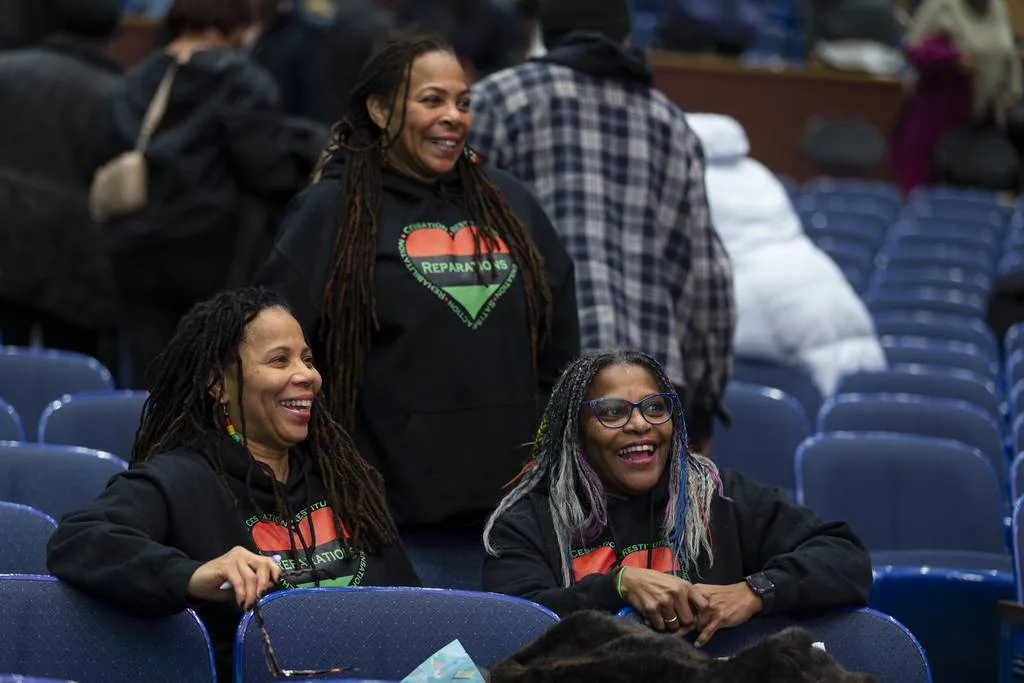



Since she already owns her home in Wheeling, Bowen said she would likely use the money for repairs but still hopes to one day come back to the area.
“Those were my two hometowns. Those are where I have roots, my kids are familiar with those communities it’s where I raised them at,” she said. “That’s home for me.”
Those roots began when Bowen’s grandparents moved to Evanston from Covington, Georgia. Her grandfather owned multiple properties in the city including the original house on Bradley Street he purchased for himself and his wife. Bowen’s younger sister bought the home several years ago.
“I’m looking at maybe two years. I would hope less, maybe three years,” Bowen said of when she’s likely to receive her funds. “It (her number) was in the 300′s”
Bowen said despite having to wait a bit longer than others for her funding, she is happy to see how far the program has come since she sat in the sanctuary of the First Church of God in December 2019 following the city’s historic reparations bill vote.
“We felt like ‘wow, we’re not asking for money because we want to be asking for money,’” she said. “The truth of the matter is when you put your foot on someone’s neck and you hold them down for so long — and we know the United States has done that to us — why not try to go back and right the wrongs and help people elevate.”
For those who didn’t attend the meeting, the list is available online at the city’s reparations webpage. The first 80 recipients will be contacted by the committee in March to begin the process of disbursing funds.
Interim City Corporation Counsel Alex Ruggie told attendees the funding is considered by both the state and federal government as payment for past harms and is tax exempt. The state has not given a definitive answer as to how accepting reparations funding will impact those on assistance programs such as TANF and SNAP. Ruggie said the city believes it should not impact eligibility for these programs but cannot guarantee so at this time.


